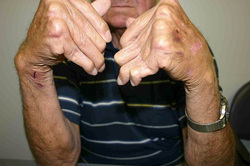Rheumatoid arthritis

Rheumatoid arthritis (RA) is a chronic inflammatory disease in which the immune system of oneself starts to attack the body. This can be primarily manifested in multiple joints including the hands, feet, ankles, wrists, shoulders, and knees. This can also affect other organs such as the skin, heart, eyes, lungs, and arteries.
For unknown reason an inflammatory response is triggered causing cells called macrophages to attack joints. The synovial tissue becomes enlarged and erosions of bone around cartilage occur.
Genetic factors account for approximately 50% of your chance of developing rheumatoid arthritis. Other proposed causes would include hormonal , environmental , immune modulators, and possible infectious diseases3.
Rheumatoid arthritis is best treated when it is caught early. It is proposed so that approximately 40% of patients with rheumatoid arthritis will have some form of disability within 10 years3.
Symptoms of rheumatoid arthritis would include: pain , swelling , stiffness , visual deformities , difficulty walking, and possibly nodules. Rheumatoid arthritis can also lead to dislocated joints, hammertoes, bunions, Achilles tendonitis, flatfoot and joint.
After a thorough history and evaluation your foot and ankle surgeon along with a team approach of your primary care physician and or rheumatologist will help to determine the best course of treatment for you. If pain is involved your doctor will likely perform x-rays to allow inspection of the bony structures of the foot/ankle. Blood tests are also helpful in understanding different types of arthritis and making the diagnosis of rheumatoid arthritis versus other arthritides and inflammatory diseases.
Rheumatoid arthritis treatment is primarily directed by your primary care provider, internist, or rheumatologist. Your foot and ankle surgeon will be able to help provide additional treatment options including orthotic devices/support , accommadative shoegear, anti-inflammatory injections, aspiration of fluid, and other nonsurgical and surgical treatment options directed at relieving pain and discomfort.
For unknown reason an inflammatory response is triggered causing cells called macrophages to attack joints. The synovial tissue becomes enlarged and erosions of bone around cartilage occur.
Genetic factors account for approximately 50% of your chance of developing rheumatoid arthritis. Other proposed causes would include hormonal , environmental , immune modulators, and possible infectious diseases3.
Rheumatoid arthritis is best treated when it is caught early. It is proposed so that approximately 40% of patients with rheumatoid arthritis will have some form of disability within 10 years3.
Symptoms of rheumatoid arthritis would include: pain , swelling , stiffness , visual deformities , difficulty walking, and possibly nodules. Rheumatoid arthritis can also lead to dislocated joints, hammertoes, bunions, Achilles tendonitis, flatfoot and joint.
After a thorough history and evaluation your foot and ankle surgeon along with a team approach of your primary care physician and or rheumatologist will help to determine the best course of treatment for you. If pain is involved your doctor will likely perform x-rays to allow inspection of the bony structures of the foot/ankle. Blood tests are also helpful in understanding different types of arthritis and making the diagnosis of rheumatoid arthritis versus other arthritides and inflammatory diseases.
Rheumatoid arthritis treatment is primarily directed by your primary care provider, internist, or rheumatologist. Your foot and ankle surgeon will be able to help provide additional treatment options including orthotic devices/support , accommadative shoegear, anti-inflammatory injections, aspiration of fluid, and other nonsurgical and surgical treatment options directed at relieving pain and discomfort.